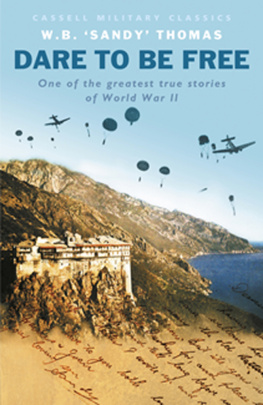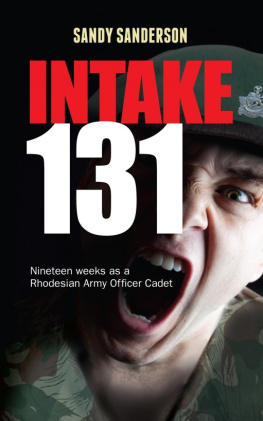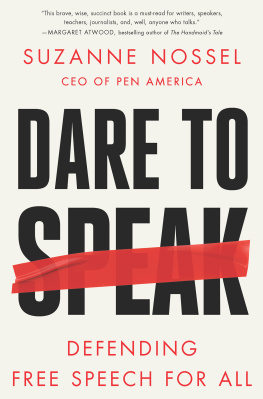W.B. ‘Sandy’ Thomas - Dare To Be Free
Here you can read online W.B. ‘Sandy’ Thomas - Dare To Be Free full text of the book (entire story) in english for free. Download pdf and epub, get meaning, cover and reviews about this ebook. publisher: Orion Books Ltd, genre: Non-fiction. Description of the work, (preface) as well as reviews are available. Best literature library LitArk.com created for fans of good reading and offers a wide selection of genres:
Romance novel
Science fiction
Adventure
Detective
Science
History
Home and family
Prose
Art
Politics
Computer
Non-fiction
Religion
Business
Children
Humor
Choose a favorite category and find really read worthwhile books. Enjoy immersion in the world of imagination, feel the emotions of the characters or learn something new for yourself, make an fascinating discovery.
- Book:Dare To Be Free
- Author:
- Publisher:Orion Books Ltd
- Genre:
- Rating:3 / 5
- Favourites:Add to favourites
- Your mark:
- 60
- 1
- 2
- 3
- 4
- 5
Dare To Be Free: summary, description and annotation
We offer to read an annotation, description, summary or preface (depends on what the author of the book "Dare To Be Free" wrote himself). If you haven't found the necessary information about the book — write in the comments, we will try to find it.
Dare To Be Free — read online for free the complete book (whole text) full work
Below is the text of the book, divided by pages. System saving the place of the last page read, allows you to conveniently read the book "Dare To Be Free" online for free, without having to search again every time where you left off. Put a bookmark, and you can go to the page where you finished reading at any time.
Font size:
Interval:
Bookmark:

Quite astonishing war adventures... written with the personal modesty which characterises most brave men
Robert Kee, Observer
Many brave men come from this part of the world [New Zealand]... few can write like Thomas... a story that loses none of its excellence for being modestly told, without heroics of any sort
Lt Gen Sir Brian Horrocks, Sunday Times
His book is a record of great personal courage and resourcefulness and an adventure story of the highest order
Edinburgh Evening News
His book, modest and engaging, is interesting not only as a genuine document of escape, but as a... vividly written description of Greek landscape
TLS
Astonishing - Absorbing - Amusing adventure story. A stunning book
Sir Terry McLean
I was riveted by [the] book from beginning to end
Sir Nol Coward, Middle East Diary
DARE TO
BE FREE
One of the greatest true stories
of World War II
W.B. SANDY THOMAS
CASSELL
To
Gay, Ce & Jo
and to
Tyson
Contents

To tens of thousands of men in the New Zealand Division, W. B. Sandy Thomas, D.S.O., M.C. and Bar, Silver Star (USA), was a fabulous character, a legend.
He was brought up on a farm in Riwaka at the top of the South Island of New Zealand, attending school in rural Motueka, not far from Nelson. Thomass great grandfather had been a colonel in the Indian Army, and Thomas applied for the Royal Military College at Duntroon in Australia. He was declined entry because he had taken agricultural science instead of chemistry at high school. Consequently, this young man started work as a clerk in the Bank of New Zealand but, ironically, the future would find him lecturing at Duntroon.
Thomas gained his commission in the Territorials before the war. In 1940 he sailed with the great convoy of troopships destined for the Middle East, but urgently diverted to the United Kingdom to counter the threat of German invasion after Dunkirk. From England he went to Egypt, Greece, and then to Crete. Thomas was left badly wounded and a prisoner on Crete, where this adventure begins. The story of his escape is still as gripping as when first published in 1951 and this edition is largely unchanged, but includes a postscript relating the astonishing coincidence of what occurred when he eventually crossed the Turkish border to Syria. The Official History of New Zealand in the Second World War 1939-45, 23rd Battalion records for 11 May the happy occasion when Lieutenant Sandy Thomas, who had been left wounded on Crete, arrived across the Turkish border at Captain Dick Connollys Post.

Crete 1941
Cripes! said Sergeant Templeton, stumbling over his mess-tin as he stepped back for a better view, cripes, they cant be real! Theyre only dummies!
The parachutists certainly seemed unreal, difficult to comprehend as anything at all dangerous. Seen against the deep blue of the early morning Cretan sky, through a frame of grey-green olive branches, they looked like marionettes, like little jerking dolls whose billowy frocks of green, yellow, red and white had somehow blown up and become entangled in the wires that controlled them. Standing next to Sergeant Templeton I struggled to grasp the meaning behind this colourful fantasy, to realise that those beautiful kicking dolls meant the repetition of all the horrors we had known so recently in Greece.
The invasion of Crete had begun. Theyre parachutists, Sergeant, I shouted, suddenly waking up and realising that something was expected of me, get the men ready for action immediately! Those Huns will fall about five hundred yards from here, but the next lot might come right on to us. Look at those planes!
Circling slowly above us were eight or nine flights of transport aircraft, ugly Junkers 52, with their black crosses showing clearly as they turned. In a few minutes the sky had filled with fighters, with gliders, and these flights of fat troop-carriers, each consisting of nine aircraft packed in close formation.
We had stood to as usual that morning some two hours before daylight, cursing as we stirred from the meagre shelter of the olive trees and wishing that we had some of the blankets and overcoats which had been left behind in Greece. There had been the normal bombardment, perhaps a little more frenzied than other mornings, of the Maleme Aerodrome less than a mile along the coast road from us. We had received our share of the overs, as well as a rigorous machine-gunning from some low-flying Stukas, but after a fortnight on Crete we had grown to expect such treatment. When the roar of the fighters had died away a little we had stood down from our posts to rummage about for some breakfast, assuming that the remaining drone of engines came from reconnaissance planes which were always over our heads, unchallenged and confident.

The first inkling that the day was to be very different happened just before the appearance of the transport planes, when a glider swished over the olive trees on its way to the aerodrome.
The noise now built up to a tremendous crescendo. Bombs crumped and roared in the distance, rifles crackled from the olive trees as the troops came into action. Machine-guns chattered as they plucked at the swinging forms in the sky, men yelled and wounded parachutists, still in their air, screamed with fear and pain. The few remaining Bofors guns joined in with their steady sharp quarks, while from nearby a three-inch mortar whoofed as it lobbed its bombs high into the air. Above it all, a deep bass rising and falling in intensity but ever present, was the drone of aero engines, punctuated by whistling bombs and diving fighters. It was a real bedlam.
My platoon organised themselves into their sections quietly and efficiently, startled perhaps, but ready for anything. I looked them over quickly, proud that they retained a soldierly appearance in spite of their experiences and losses in Greece. They were a grand crowd, I thought, as I waved them to take cover in the slit trenches until our orders arrived; they had been wonderful company for the past year. It was, in fact, just over a year since I, a very raw Second Lieutenant of twenty years, had welcomed them all into the mobilisation camp at Burnham, New Zealand. They were all in civilian clothes then, and a rough assortment they looked. Most of them were from my district and were either miners, bushmen or farm hands. There were also those who, like me, had been country bank clerks, or shop assistants. We spent four terribly busy but happy months training in New Zealand and then sailed for England where we completed our training.
It was tragic that after so much enthusiastic drill and study of war we should have been sent via Egypt to such a hopeless debacle as Greece, where these men fought valiantly, but against such frightful odds that withdrawal and evacuation had been inevitable.
Major Thomason, my veteran Company Commander, came winding through the olive trees with his distinctive limping gait, calling to me as he approached. He grinned at me, unruffled by the confusion all around, and said, Well, young Thomas, heres the war for you, brought right to your doorstep. Now pay attention. Those Huns we saw falling are part of a whole battalion group which has fallen on the 22nd Battalion positions. The Colonel thinks that some of them were dropped wide of their objective. At the moment theyre getting organised between our own 23rd Battalion positions and the main 22nd area on the high ground by the airfield. They could build up quite a threat there and prevent the execution of our counter-attack role. He paused and looked straight into my eyes, commanding and aggressive. Move out with your platoon and clean em up.
Font size:
Interval:
Bookmark:
Similar books «Dare To Be Free»
Look at similar books to Dare To Be Free. We have selected literature similar in name and meaning in the hope of providing readers with more options to find new, interesting, not yet read works.
Discussion, reviews of the book Dare To Be Free and just readers' own opinions. Leave your comments, write what you think about the work, its meaning or the main characters. Specify what exactly you liked and what you didn't like, and why you think so.













